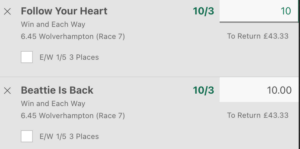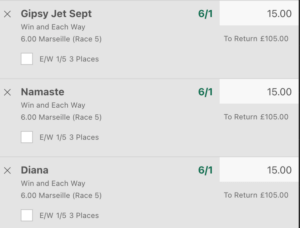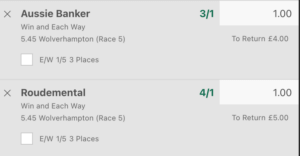A Dutching bet is where you wager funds on multiple outcomes on the same event, in an attempt to make a potential profit. Dutching is a betting technique used by punters, although it’s important to remember that you have to stake sensibly, as if you don’t, then you’re potentially risking losing out on any profit.
There any guarantees in betting, and Dutching comes with an element of risk, especially as if both outcomes that you’ve wagered your funds on don’t win, then you’ll be losing a potentially greater stake, compared to backing a single selection in your chosen event.
Dutching Bet Examples
There are three different types of dutch bets, and we’ve provided an example of each being in place for football, horse racing, and tennis, which are popular sports in which this betting strategy is used.
Football
Simple Dutch Betting
Simple Dutch betting is where the stake on each selection stays the same, or is slightly reduced, to ensure a profit is made from the betting selections. Below is an example of equal stake and reduced stake Dutching in football on Betfair.
Equal Stake Dutch Bet
- Stake £20 on a football selection with odds of 5/1
- Stake £20 on another football selection with odds of 5/1
- Total stake = £40 (£20 + £20)
- If either selection wins = £60 profit (£100 return – £40 stake)
Reduced Stake Dutch Bet
- Stake £5.50 on selection ‘A’ with odds of 8/1
- Stake £9.50 on selection ‘B’ with odds of 5/1
- Total stake = £15 (£5.50 + £9.50)
- If selection ‘A’ wins = £34.50 profit (£49.50 return – £15 stake)
- If selection ‘B’ wins = £42 profit (£57 return – £15 stake)
Horse Racing
Set-profit Dutch Betting
Like any type of betting technique, you’re going to want to win as much as possible, but if you’re using the set-profit Dutch betting technique, then you’ll have a different mindset. The bettor will have a target profit to make from the sporting event they’re wagering their funds on. Below, we’ve provided an example of a set-profit Dutch bet on horse racing on bet365, which is a popular choice of sport to use for this betting technique.
Two-selection set-profit Dutch bet
- Target profit = £30
- Stake £10 on horse ‘A’ with odds of 10/3
- Stake £10 on horse ‘B’ with odds of 10/3
- Total stake = £20 (£10 + £10)
- If either horse wins = £23.33 profit (£43.33 return – £20 stake)

Three-selection set-profit Dutch bet
- Target profit = £30
- Stake £15 on horse ‘A’ with odds of 6/1
- Stake £15 on horse ‘B’ with odds of 6/1
- Stake £15 on horse ‘C’ with odds of 6/1
- Total stake = £45 (£15 + £15 + £15)
- If any horse wins = £60 profit (£105 return – £45 stake)

Tennis
Set-amount Dutch Betting
Set-amount Dutch betting is all about the bettor limiting their overall stake on a bet, instead of targeting a set profit. Below, we’ve provided you with an example of a set-amount Dutch bet on tennis with William Hill, which is a great bookie to use for this betting technique.
- Total stake = £20
- Stake £14.50 on selection ‘A’ at odds of 5/1
- Stake £5.50 on selection ‘B’ at odds of 10/1
- Total stake = £20 (£14.50 + £5.50)
- If selection ‘A’ wins = £72.50 profit (£87 return – £14.50 stake)
- If selection ‘B’ wins = £55 profit (£60.50 return – £5.50 stake)
How To Do A Dutching Bet On bet365
To place a Dutching bet on bet365, the process couldn’t be simpler, which will be pleasing to hear for new customers which are unfamiliar with this betting technique. We’ve provided a step-by-step guide on how to place a Dutching bet on bet365.
- Click here to be directed to the operator’s site.
- Log into your bet365 account with the username and password you created when signing up.

- For this example, we’ll look to place an Equal Stake Dutch Bet on horse racing, so we’ll select two horses from the same race.
- Once these have been selected, enter the same stake for both betting selections.

- Click the ‘Place Bets’ button, which is coloured green on bet365’s site.
Is A Dutching Bet Worth It?
There are plenty of positives and negatives to consider before looking into Dutching, and we’ve listed some of those below. Each punter has their preference for various betting techniques, so you can make your judgement as to whether Dutching is for you or not, but remember to gamble responsibly and with funds that you can afford to lose, as there aren’t ever any guarantees in betting.
Pros
- Based on probability, you have more chance of returning a potential profit using Dutching, as you’re backing multiple outcomes on the same event.
- Dutching is a betting technique that can be used on many different sporting events.
Cons
- Doesn’t always guarantee winning bets, and comes with additional risk at a greater stake if covering multiple outcomes.
Can be difficult to work out potential returns manually.
Dutching Bet FAQ
This is purely down to the bettor, which event and the betting market they’re betting on. If you’re covering two out of three potential outcomes in a football match, then there will be two bets.
Whereas if you’re looking to cover multiple outcomes in a horse racing event, then you might be covering more bets.
You’ll hopefully only need one winner in the Dutching bet to earn a potential profit. You must stake the correct amount on each outcome though, as if you don’t, then you run the risk of losing some of your potential profit in the event you’ve wagered your funds on.





